The Hindu Editorial Analysis- 23rd December, 2020 | Additional Study Material for UPSC PDF Download
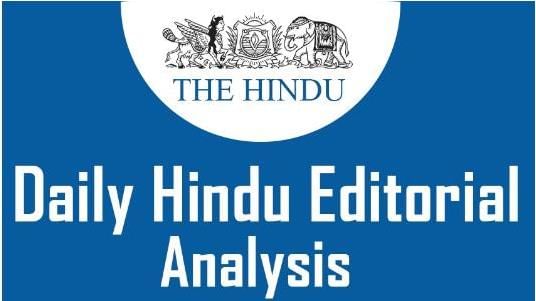
1. Delaying the Inevitable
GS 2- Important aspects of governance, transparency and accountability
Context
The government has recently has decided to keep in suspension the critical provisions of the Insolvency and Bankruptcy Code (IBC) of 2016 till March 31, 2021.
The Insolvency and Bankruptcy Code, 2016
- The Insolvency and Bankruptcy Code, 2016 (IBC) is the bankruptcy law of India which seeks to consolidate the existing framework by creating a single law for insolvency and bankruptcy.
- The Insolvency and Bankruptcy Code, 2015 was introduced in Lok Sabha in December 2015. It was passed by Lok Sabha on 5 May 2016 and by Rajya Sabha on 11 May 2016. The Code received the assent of the President of India on 28 May 2016.
- Certain provisions of the Act have come into force from 5 August and 19 August 2016.
- The bankruptcy code is a one stop solution for resolving insolvencies which previously was a long process that did not offer an economically viable arrangement.
- The code aims to protect the interests of small investors and make the process of doing business less cumbersome.
Key Terms
- Insolvency is a situation where individuals or companies are unable to repay their outstanding debt.
- Bankruptcy, on the other hand, is a situation whereby a court of competent jurisdiction has declared a person or other entity insolvent, having passed appropriate orders to resolve it and protect the rights of the creditors. It is a legal declaration of one’s inability to pay off debts.
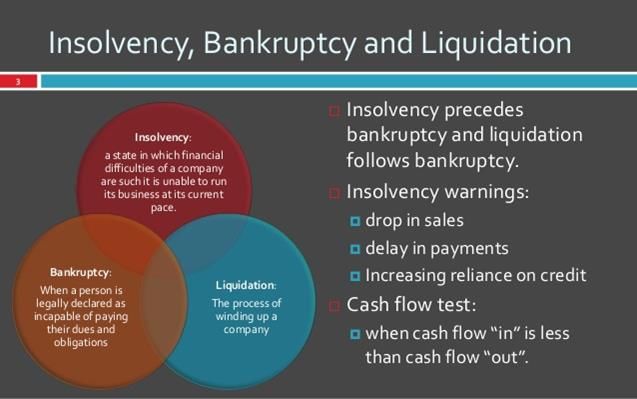
Recent Changes in the IBC
- The government had raised the threshold of loan defaults that would spark off insolvency proceedings from ?1 lakh to ?1 crore on the day of the lockdown’s announcement due to disruptions caused by Covid.
- It had indicated that if things did not improve by April-end, the suspensions of certain sections of the IBC for six months could be considered to prevent companies at large from being forced into the insolvency process for a ‘force majeure’ default.
- An ordinance, in June, indefinitely barred the initiation of insolvency proceedings both, voluntarily or by creditors, for defaults arising on or after March 25, 2020, for a period of six months that could be stretched to a year.
- When the initial six months of forbearance under the IBC expired, it was extended till December 25.
- Union Finance Minister’s pronouncement now, of a further suspension, would mean the one-year limit permitted by the law is fully used up.
- The government must make it clear that this is the last such window of respite, even as the necessity for a blanket suspension of IBC at this point in time is not as apparent as it was in the first or second quarter of 2020-21.
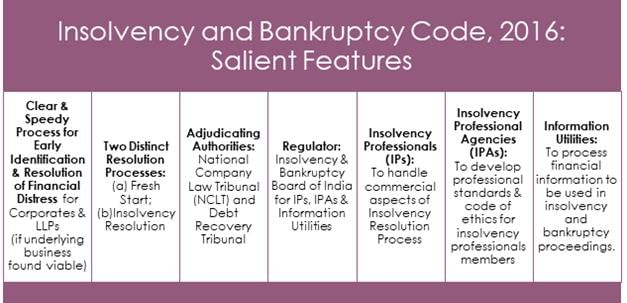
Who Facilitates The Insolvency Resolution Under The Code?
- Adjudicating authorities: The proceedings of the resolution process will be adjudicated by the National Companies Law Tribunal (NCLT), for companies; and the Debt Recovery Tribunal (DRT), for individuals. The duties of the authorities will include approval to initiate the resolution process, appoint the insolvency professional, and approve the final decision of creditors.
- The Insolvency Professionals: These professionals will administer the resolution process, manage the assets of the debtor, and provide information for creditors to assist them in decision making.
- Information Utilities: Creditors will report financial information of the debt owed to them by the debtor. Such information will include records of debt, liabilities and defaults.
- Insolvency Professional Agencies: insolvency professionals will be registered with insolvency professional agencies. The agencies conduct examinations to certify insolvency professionals and enforce a code of conduct for their performance.
- Insolvency and Bankruptcy Board: The Board will regulate insolvency professionals, insolvency professional agencies and information utilities set up under the Code.
Suggestions
- Stretching the IBC’s abeyance, for one, does not settle with the government’s proclamations of a firm, V-shaped economic recovery.
- Finance Ministry mandarins have repeatedly talked up growth prospects by flagging indicators returning to pre-COVID-19 levels, in several sectors.
- Surely, businesses in those sectors need no longer be sheltered from exits if they are not competitive.
- The government, by now, should know which sectors continue to remain in trouble.
- And if it is concerned about small and medium businesses, it could tweak the default threshold limit a tad higher, while letting bankruptcy processes function again for larger loan accounts.
- But a catch-all suspension could burden banks further and does not appear to have enthused industry either.
- One reason could be that the suspension also cuts off businesses’ ability to voluntarily enter insolvency — for many, post-COVID-19 operations may not seem viable.
- Denying them an exit route so as to cut their losses, while their assets shed value is a lose-lose proposition for both borrower and lender.
- A more nuanced approach would have been better for banks, businesses and the economy.
Conclusion
Delaying the inevitable would mean greater financial stress ahead, as the restructuring and recovery of bad loans shall get tardier and future growth momentum would be punctured at the cost of understating present systemic stress.
2. Put the Farm Laws On Hold, Uphold Farmers’ Rights
GS 2– Govt. policies and interventions
GS 3– Agriculture, MSP
Context
- The Supreme Court’s recent suggestion to form a joint panel to look into the demands of the agitating farmers, has given a breather to the government, although such an offer, made officially at the outset, was rejected by farmer groups as a “dilly-dallying tactic”.
- Farmers’ representatives see a moral victory in the Supreme Court’s observations, in that the top court did not outright reject their demands or the right to protest.
Farmer Protests
- Agriculture producers are demanding a total repeal of the new reforms-oriented laws that provide for setting up private markets outside of designated, allow contract farming without government regulation and also lift stockholding limits for farm produce.
- A group has been formed on how to approach the matter legally. Be that as it may, the starting point of farmers’ demands in relation to the new farm laws was for mandatory payment of the Minimum Support Price (MSP) for notified farm produce in private markets to be set up.
- Among other objections is the amendment to the Essential Commodities Act that provides for lifting of stock-holding limits on essential commodities.
What New Act Entails
- Under the new Act, any trader, company or agri-business, etc. will be able to store unlimited quantities of say, wheat, rice, sugar, onion and potato, for any period of time.
- Hoarding is normally related to speculation for profit that hits farmers and consumers alike.
- The government is banking on its reforms-oriented formation of producer companies as a panacea for all ills in the small and marginal farm sector.
- It has fixed an ambitious target of setting up 10,000 Farmer-Producer Organisations (FPOs) by 2023-24 which must be registered as a company or a cooperative to run farming as a business.
New Farm Laws Smell of Corporatisation
- The mechanisation and corporatisation of agriculture, that is at the centre of the reforms-oriented laws, is the threat to the survival of 56.7% of the total workforce and 86.08% of small and marginal operational landholding farmers (as per the Tenth Agriculture Census, 2015-16) engaged in farming activity in the country.
- Without adequately skilling, training and empowering the small and marginal farmers to become competitive on their land holding of less than two hectares, the government brought the new laws through the ordinance route, and that too when the country has been preoccupied and grappling with the COVID-19 pandemic.
Reforms and Governments
- Reforms in the agriculture sector have been an on and off process with successive governments since the economic liberalisation in 1991 and more so, under the subsequent World Trade Organization (WTO) norms.
- And, even though the WTO seems to be collapsing under its own weight from an unequal set of rules that favour developed countries, India and the other developing countries fought for a ‘peace clause’ to pursue country-specific food security policies in keeping with their socio-economic responsibility.
- Domestically, however, parties in opposition, in their time, raise objections to reforms in the farm and retail sectors.
- The promoter can belong to private companies or a non-governmental organisation arm of mega companies or agri businesses which claim know-how on availing government grants, tax rebates and can leverage official schemes.
- Thus, an agri business can have its foot in the door even before a FPO is registered. Government guidelines facilitate this.
- Even though the idea was floated almost two decades ago when company law was amended to enable this, only 881 FPOs have been registered so far.
- Significantly, the Swadeshi Jagran Manch, an affiliate of the ruling Bharatiya Janata Party, has backed guaranteed payment of MSP to farmers so that growers are not exploited by big procurement companies.
Challenges For the Farmers Due To the Laws
- Farmers are now faced with new amendments to the Electricity Act which propose to fully privatise distribution of power, a crucial input in farm irrigation.
- At present, payment of MSP for notified commodities even inside designated mandis is not mandatory.
- Without the backing of the law, there is no guarantee against this in the new markets that are being conceived — and what is agitating farmers.
- Fragmented landholdings have become a problem for big ticket farming seeking economies of scale in a competitive market.
Way Forward
- Requirement for an FPO to hire the services of an experienced resource institution as promoter.
- It is important in the value chain to start from the backward linkage, i.e., the farmer, the last man as Gandhi would say.
- Govt. needs to think and discuss about how the last man benefit from these reforms or should there be efforts to lower input costs to make farming remunerative for producers.
- The small and marginal farm sector, especially, faces a threat and the government needs to ensure wide consultations
Need For Consensus
- For now, it will be appropriate for the government to put on hold the implementation of contentious pieces of legislation and initiate widespread, transparent and participative consultations with all stakeholders including gram panchayats to arrive at informed decisions by consensus.
- Whatever be the criticism of the National Advisory Council set up during the previous United Progressive Alliance regime, it played a significant role in making “propeople” the rightsbased National Rural Employment Guarantee Act and the National Food Security Act.
- Such acknowledgement of farmers’ rights is the need of the hour.
3. Five Years Since Paris, an Opportunity To Build Back Better
GS 3- Conservation
Context
Recently countries of the world celebrate the fifth anniversary of the Paris agreement. This celebration held as Climate Ambition Summit 2020. Many countries including India and the European Union participated in it.
Climate Ambitious Summit
- The co-hosting countries of this summit are the United Nations, the United Kingdom and France in partnership with Chile and Italy.
- COP26 of UNFCCC will be held in Glasgow of UK in 2021.
- In the summit, leaders gave new commitments to tackle climate change and deliver on the Paris Agreement.
- Leaders across government, business and civil society gathered for this online summit.
- In the summit, activists were eager for China to put some efforts of its bold 2060 carbon neutrality pledge.
- Activists were disappointed. In this online summit, leaders offered only incremental steps.
- The underwhelming summit puts more pressure on President-elect Joe Biden, on climate change when he takes office-starting with rejoining the Paris deal.
- As political and corporate leaders force to prove how progressive they are on the issue.
- The challenge is getting leaders to make specific, short-term commitments that back up their impressive sounding long-term goals.
- The European Union, UK and other 75 nations went into the summit with new emissions pledges.
- The countries like, Argentina and the Vatican pledged carbon neutrality by 2050
- South Asian country Pakistan will stop building new coal-fired power plants. The country set a goal to get 60% of its power from renewables by 2030
- Peru pledged to cut emissions 40% by 2030, its previous target was of 30%
- China would cut emissions per unit of GDP by more than 65% from 2005 levels by 2030. As China's previous target was of cutting pollution by 60% to 65%
- India commitment to increase renewable power capacity to 450 gigawatts by 2030.
- European country Italy will donate 30 million euros to the UN Adaptation Fund.
Concerns
- During the last five years from the Paris summit, the determination of the global community has certainly been tested.
- In the past few months, with the pandemic, all have been hit by a virus with a potentially longlasting impact on our society and economies.
- The main question before us that 'During this pandemic, is it realistic to call for stronger global action to fight climate change?'
Works By European Union For Climate
- For the future prosperity, we must invest in greening the global economy.
- Recovery after Post COVID19 needs to be a green recovery.
- In 2019, the European Commission launched the European Green Deal.
- This deal is a new growth model and roadmap to achieve climate neutrality in the EU by 2050.
- As well as the EU issued “Next Generation EU” recovery package and EU's next longterm budget will earmark more than half a trillion euros for climate change.
- Before Climate Ambitious Summit, to reach climate neutrality by 2050, EU leaders unanimously agreed on the 2030 target of reducing greenhouse gas emissions by at least 55% compared to 1990 levels.
- The cost of solar photovoltaics has already declined by 82% between 2010 and 2019.
- This 55% target of the EU will even help to save €100 billion in the next decade and up to €3 trillion by 2050.
Works By India For Climate
- The EU and India are committed to the implementation of the Paris Agreement.
- India started many flagship initiatives in this regards. main works include International Solar Alliance, the Coalition for Disaster Resilient Infrastructure and the Leadership Group for Industry Transition.
- India and EU are also engaged to make a success of the forthcoming COP 26 in Glasgow on climate change and COP 15 in Kunming on biodiversity.
International Solar Alliance
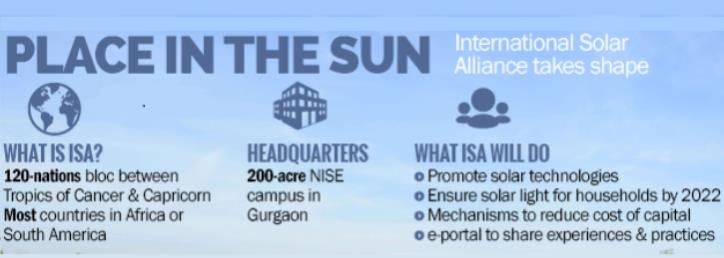
Coalition For Disaster Resilient Infrastructure
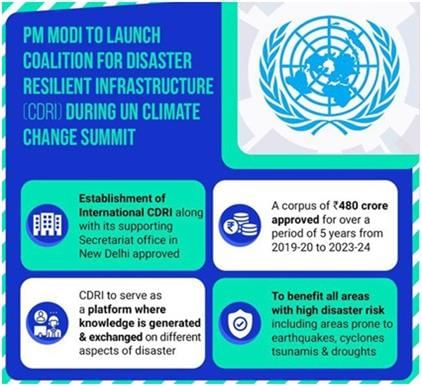
Going Forward
- There is a sense of global momentum which is increasing towards keeping the promise of the Paris Agreement.
- Now Five years after, it is more important than ever to comes forward with clear strategies for net-zero emissions and to enhance the global level of ambition for 2030.
- Climate financing of $100 billion to countries most in need, these will be deliverables for the climate when they resume at COP 26 in Glasgow.
Suggestion
- Good public policies are good but not sufficient.
- We have to foster small individual actions to attain a big collective impact.
- The world should mobilise its best scientists, business people, policymakers, academics, civil society actors and citizens to protect together and get climate neutrality.
Conclusion
- No government can never alone tackle climate change.
- It is the need of the hour to pursue all efforts to foster cooperation with partners from all around the world.
- The rapid development of solar and wind energy in India in the last few years is good.
- Our global, regional, national, local and individual recovery plans are an opportunity for ‘build back better’.
|
21 videos|562 docs|160 tests
|
FAQs on The Hindu Editorial Analysis- 23rd December, 2020 - Additional Study Material for UPSC
| 1. What is the main argument of the article "Delaying the Inevitable"? |  |
| 2. What are the demands of the farmers regarding the farm laws? |  |
| 3. What is the significance of the five-year anniversary of the Paris Agreement mentioned in the article "Five Years Since Paris, an Opportunity To Build Back Better"? |  |
| 4. How can the Paris Agreement be used as a framework for building back better? |  |
| 5. What is the main focus of the article "Put the Farm Laws On Hold, Uphold Farmers’ Rights"? |  |
















